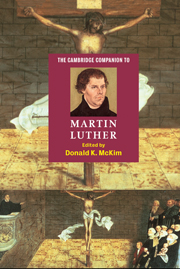14 - The legacy of Martin Luther
from Part III - After Luther
Published online by Cambridge University Press: 28 May 2006
Summary
Martin Luther had a fairly low opinion of himself, though one must leave open the question if this was because he was profoundly convinced that such was the case, or because he thought it to be good politics to say so, or because he saw himself as analogous to the Old Testament prophets who similarly had a way of denouncing their own importance. “I am but a stinking bag of worms,” he observed on one occasion. And even though he had also insisted that at his death all his books and writings should be burned and “the children of God not be called by my name,” neither, in fact, proved to be the case. Luther's long shadow fell over the subsequent centuries. With the passing of time, posterity chose not to take Luther at his word, and the importance he had attained during his own lifetime was dwarfed by an ever increasing importance afterwards. Arguably, Luther's legacy has been one of the most striking phenomena in Western intellectual history. The fundamental observation, all the same, is that such dramatic eminence notwithstanding, Martin Luther has also been one of the most controversial figures in Western life and thought. Indeed, there has been controversy not only about his theology, but also about his impact on German history. For a long time, mentioning the name of Luther meant to step on to the barricades.
- Type
- Chapter
- Information
- The Cambridge Companion to Martin Luther , pp. 227 - 239Publisher: Cambridge University PressPrint publication year: 2003



